FH Paediatric screening in Europe

FH Paediatric screening in Europe – Paving the Way for Prevention and Cardiovascular Health
Just over a week away from FH Awareness Day – 24 September – we look back 10 days to a landmark meeting on FH Paediatric Screening in the Czech Senate, under the auspices of EU Czech Presidency on 6 September 2022. This meeting will change history. Why? Because the Call to Action emerging from this gathering – the Prague Declaration on FH Paediatric Screening, endorsed by the Czech government, major global and European medical societies, public health organisations, patient organisations and others, is creating an unprecedented level of commitment among European decision-makers to make FH paediatric screening a reality. Not a moment too soon, many will say. WHO identified FH as a major public health issue almost 25 years ago – since then, comparatively little has happened and the tragic loss of life and human suffering ignored.
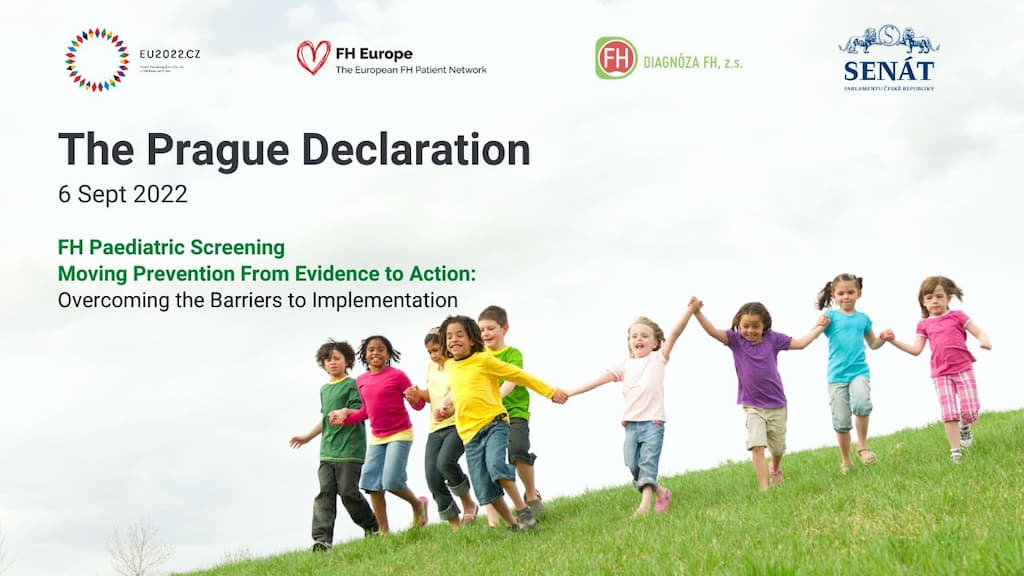
For decades, the problem of Familial Hypercholesterolaemia (FH) has been unresolved, with FH remaining undiagnosed and untreated until a serious cardiovascular health event takes place, with tragic consequences for individuals and families. This is despite robust medical guidelines, first line treatment availability and substantial scientific progress leading to a better understanding of the condition and the development of innovative therapies. Importantly, cost- effectiveness studies paint a very clear picture – FH screening reduces the human, financial and societal burden of cardiovascular disease.
FH in simple terms means very high cholesterol, which runs in families. It is a common inherited metabolic condition and a serious, non-modifiable, factor that increases greatly the risk of cardiovascular disease (CVD) early in life. In Europe approximately 2.5 million people, including 0.5 million children, are affected. Unfortunately, 90 % of those living with the condition are not aware of it – leading to enormous and unnecessary human pain– and significant costs to the health system and society. In its rarest form HoFH, unless diagnosed early, results in avoidable childhood deaths. This makes it not only a major and avoidable public health issue but also a fundamental human rights – and children’s rights issue.
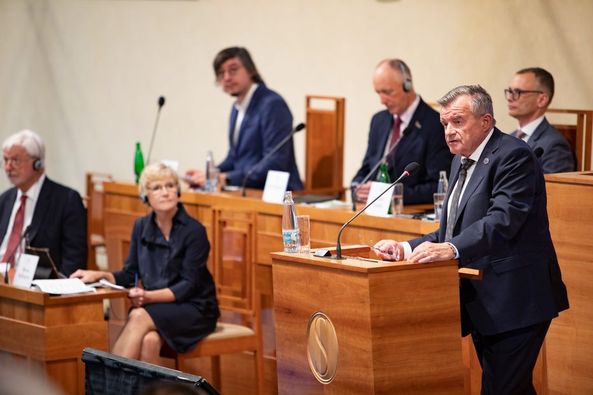
Dr Roman Kraus, Chair of the Healthcare Committee of the Senate, stated at the meeting “I fully agree this is indeed a rights and children’s rights issue. This is a key message for me personally. Another key message for me is the move towards cardiovascular health and rather than cardiovascular disease – to really embed a ‘prevention’ mentality. FH Paediatric Screening is a fantastic torchbearer that can inspire others. I believe what we have achieved today will enable many, many more to live longer, healthier, and happier lives and manage their condition through the life course – it will avoid deaths, disability, family tragedy and in the case of HoFH, very early deaths in childhood. We have a duty and a responsibility to move forward and put the Prague Declaration into practice. I commit personally to introducing the Declaration in the Senate and the Parliament and to organise a round tablet that will focus on implementation”
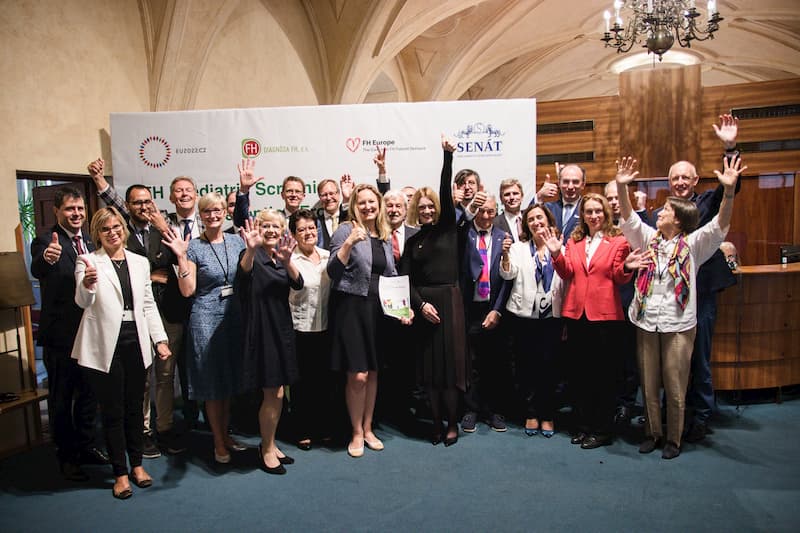
The meeting “FH Paediatric screening – moving prevention from evidence to action: overcoming the barriers to implementation” was organised by FH Europe – the umbrella patients’ organisation, together with Diagnoza FH, its Czech Network member organization, convened decision-makers and thought leaders including the Czech Minister Deputy Minister, the Senate‘s chief of health, representatives of the European Commission, the World Health Orgnization, key public health European institutions, scientific and medical experts and patient ambassadors.
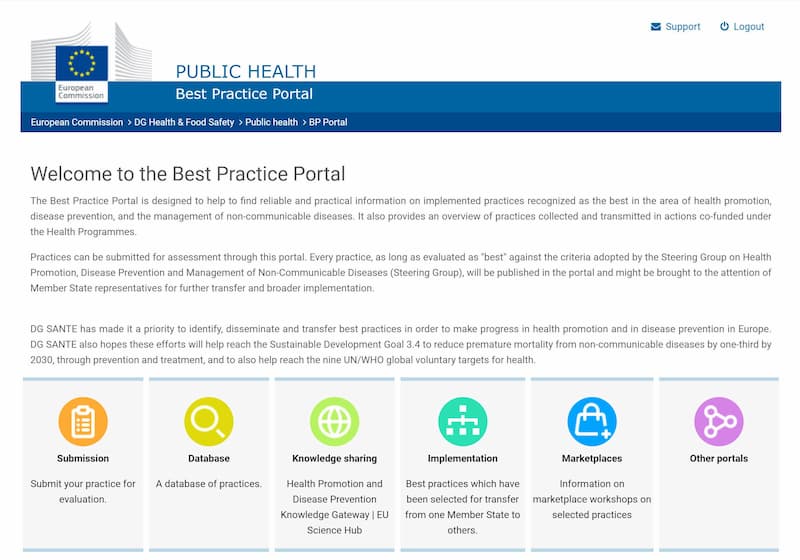
With cardiovascular diseases (CVD) prevention and cardiovascular health (CVH) promotion recently emerging as a prominent feature of health policy across the EU – FH early screening has gained more attention and recognition. In January 2021, an important milestone was achieved by FH Europe and leading experts. FH paediatric screening was recognised as an EU Best Practice under the European Commission’s DG SANTE’s Public Health Best Practice Portal. A Technical Meeting under the Slovenian EU Presidency was then held in October. It examined the evidence for universal paediatric FH screening, reviewing the programmes that had been undertaken or planned, and listening to patient stories of the consequences of an absence of FH screening on individuals’ and family lives. The overriding message from the event was that “the time to act is now”. A very strong consensus and commitment was achieved to ensure FH paediatric universal, cascade and opportunistic screening was available to all who need and choose it across Europe, and published in the European Heart Journal. Just before the Prague meeting, a policy recommendations were published in the European Journal of Preventive Cardiology, “Paediatric Familial Hypercholesterolaemia Screening in Europe – Public Policy Background and Recommendations” , which cemented further the evidence.

The Czech Senate meeting looked beyond the technical questions and explored what barriers are preventing widespread implementation across Member States and how they may be overcome. It underlined the contribution FH Paediatric screening can make to the new strategic initiative Healthier Together the EU launched to combat non-communicable diseases (NCDs). This strategy, drawing on the approach taken in the EU Beating Cancer plan, provides strategic EU leadership and funding to help Member States focus on implementing concrete priority actions in five areas, including cardiovascular disease, and in particular on proven preventive measures such as FH Paediatric screening. This action plan has long been called for by cardiovascular health advocates, most recently within the European Alliance for Cardiovascular Health (EACH), which has published in May A European Cardiovascular Health Plan: The need and the ambition to secure even greater action to promote cardiovascular health requiring measures that prevent the onset of cardiovascular disease.
Deputy Minster Dvořáček described wider challenges and opportunities “We live in highly complex times – with global conflict and the aftermath of the Pandemic that is still rearing its ugly head. We are still grappling, as a society, on how to deal with the immediate threats, but also how to build back better, with more resilience, more humanity, and more hope. I see this initiative on FH Screening as a symbol of this. We must also acknowledge the huge learnings from COVID that will strengthen us moving forward – helping to accelerate progress through digital transformation and new systems’ thinking.”
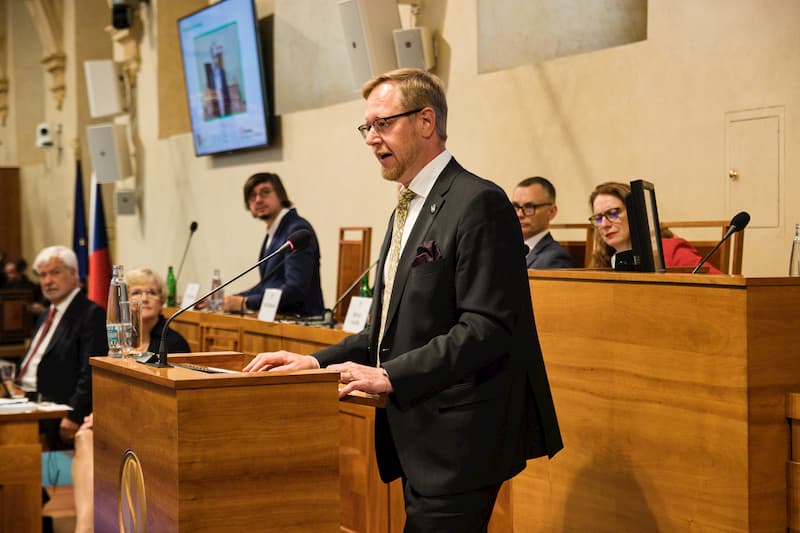
He added “As a long-time champion of patient engagement in the Czech Republic, health literacy and the power of quality information and knowledge are very close to my heart. And I understand that creating awareness among patients and citizens about FH as a non- modifiable risk factor to prevent premature heart attacks and strokes is also one of your key objectives. We need to prevent the preventable”.
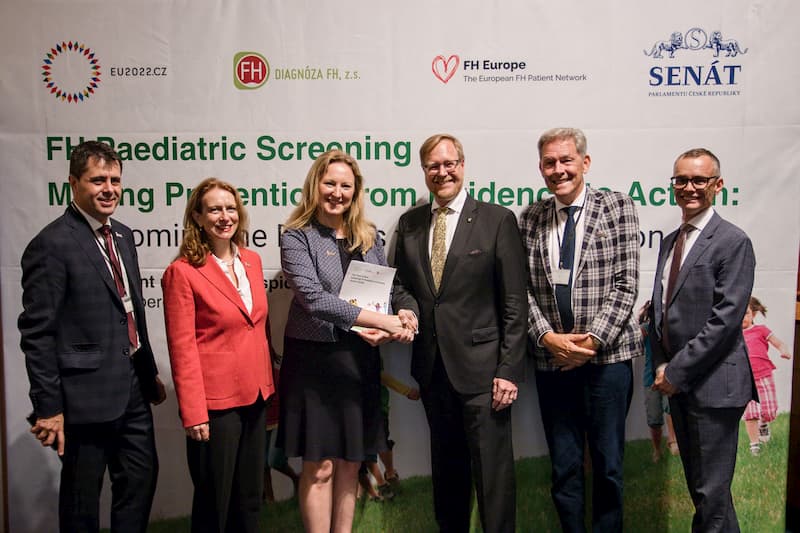
Magdalena Daccord, FH Europe’s Chief Executive said “We are extremely excited about the outcome of this critical meeting and very appreciative of the support of our friends in the Czech Republic in making it possible. Our discussions today have solidified our very strong case for screening – and will help to create new resources to make it happen. This is part of a wider shift from cardiovascular disease towards cardiovascular health in Europe. We have to pose the question “if not now, then when” – and the opportunity cost in lives and money, of continued inertia in this space. Covid was a wake-up call – and showed us what is possible, and how to act swiftly and resolutely on evidence based public health – we can do the same for FH Paediatric Screening”
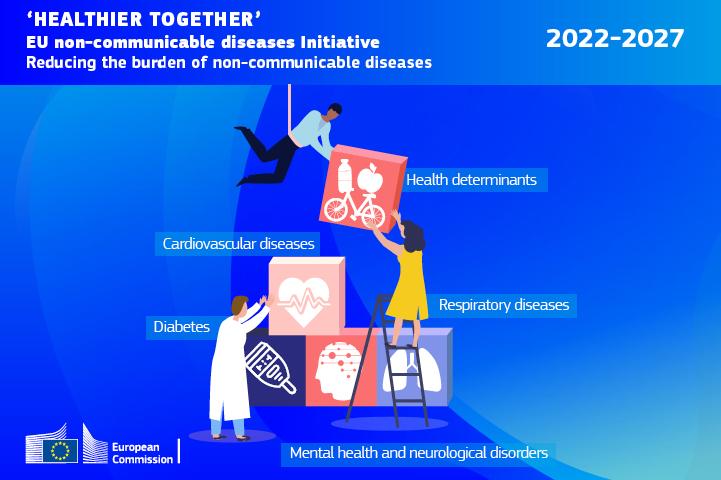
The meeting came two days before the European Commission’s (DG Health and Food Safety) Best Practice Marketplace event, in which FH Europe presented the FH paediatric screening to Member States representatives and made the case for widescale implementation. Thirteen countries participated actively in this meeting, and whilst this demonstrates a growing interest, it is not yet enough to address the burden of FH across Europe. We commend the Commission for organising this event and for the opportunity to be an active part of its bigger agenda on prevention. FH Paediatric Screening is possible to achieve – as the Czech Senate meeting underlined, it can be a ‘low-hanging fruit’ and exemplar for other prevention initiatives to learn from and be inspired by.
Under its EU presidency, the Czech Republic is spearheading an initiative designed to enhance cooperation and equity in provision of FH paediatric screening within the EU, where several differing models of care can be recognized within the individual Member States.
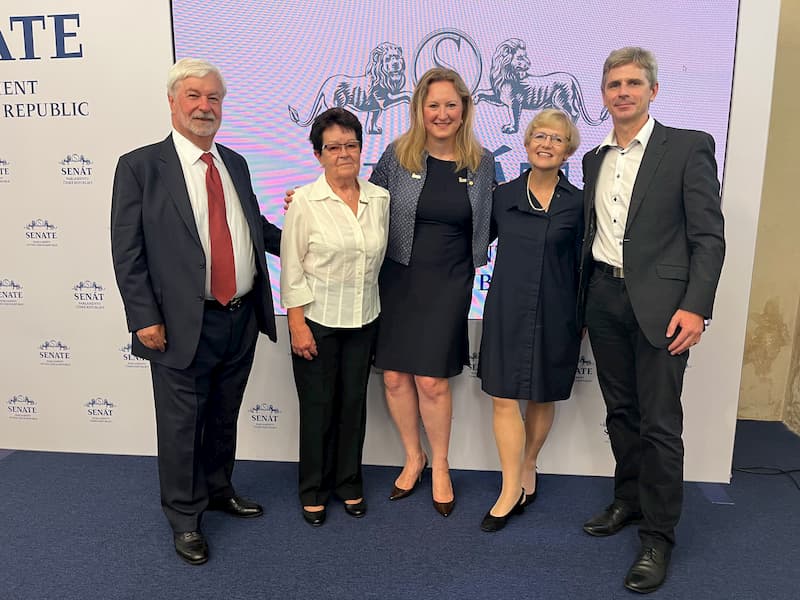
John Reeve, FH Europe President concluded “24 years on from the original publication by WHO calling for action on FH – I hope we can finally move forward, make a breakthrough – going beyond assessing the evidence and understanding the barriers to implementation in the real world. We have a moral responsibility to get this right for countless children and families whose lives will otherwise be ripped apart’
For more information, please visit:
https://www.fhscreening2022.eu/
For more information, please contact:
- Magdalena Daccord, FH Europe, md@fheurope.org, – fheurope.org
- Kristyna Cillikova, Diagnoza FH, komunikace@athero.cz – diagnozafh.cz
FH Europe is supported by an educational grant from Amgen Limited, Sanofi, Regeneron, Akcea Therapeutics Inc. and Amryt
Site by: Vovi Web Design

